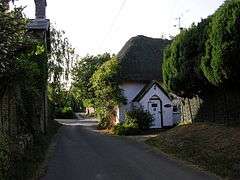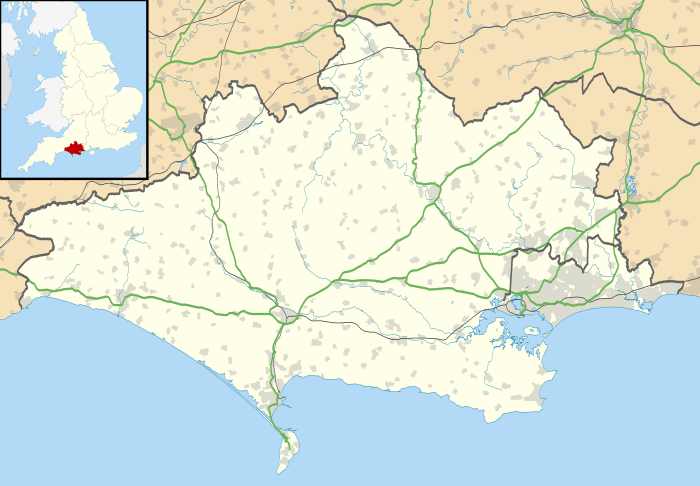Woodyates
Woodyates is a small hamlet, sometimes considered a village, in the county of Dorset, near its border with Wiltshire, in the west of England.
| Woodyates | |
|---|---|
 Woodyates | |
 Woodyates Location within Dorset | |
| OS grid reference | SU0219 |
| Civil parish | |
| Shire county | |
| Ceremonial county | |
| Region | |
| Country | England |
| Sovereign state | United Kingdom |
| Post town | SALISBURY |
| Postcode district | SP5 |
| Dialling code | 01725 |
| Police | Dorset |
| Fire | Dorset and Wiltshire |
| Ambulance | South Western |
| UK Parliament | |
History
The name means "wood gates" and is believed to refer to the position of Woodyates at the entrance to the wooded area of Cranborne Chase.[1]
The topographer James Bell described it thus in 1835 -
WOODYATES (West), an extra-parochial liberty, in the hundred of Wimborne-St-Giles, Shaston (East) division of the co. of Dorset. It consists of a single farm, and is crossed by the Roman road from Dorchester to Old Sarum.[2]
The Roman road (Ackling Dyke) is especially well preserved. In Highways and Byways in Dorset (1935), Sir Frederick Treves notes that "In no part of Dorset can the actual undisturbed Roman road be seen at greater advantage or for greater extent than about Woodyates."[3]
A Romano-British defensive ditch called Bokerley Dyke also runs near the village.
The estate also contained an important coaching inn, once called the Woodyates Inn, later the Shaftesbury Arms.[1] This was a staging point of the Trafalgar Way, and a commemorative plaque can be seen there.
In the 18th century, Woodyates was a property of Thomas Pitt.
Woodyates was the site of the training establishment of William Day, who sent out the winners of many important horse races including Foxhall, winner of the Grand Prix de Paris, Cesarewitch and Cambridgeshire in 1881.
Present day
Woodyates is served by a Damory Coaches bus which runs between Salisbury and Wimborne St Giles.
See also
Notes
- Charles George Harper, The Exeter Road: the Story of the West of England Highway (reprinted 2009), p. 96
- James Bell, A new and comprehensive gazetteer of England and Wales (1835), p. 389
- Sir Frederick Treves, Highways and byways in Dorset (1935), p. 84
External links
| Wikimedia Commons has media related to Woodyates. |
Bokerley Dyke at Woodyates https://historicengland.org.uk/listing/the-list/list-entry/1012138